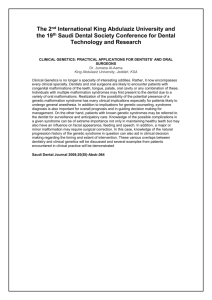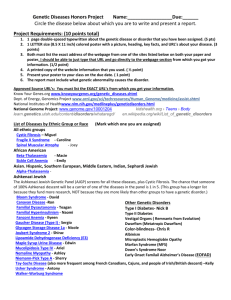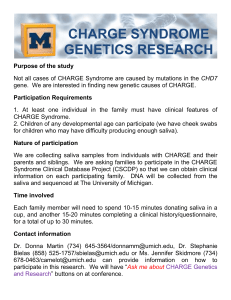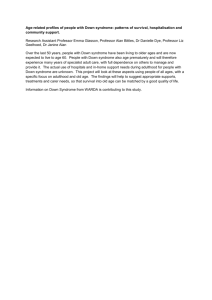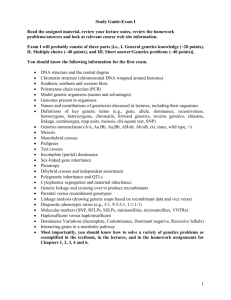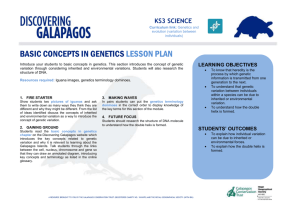Medical Genetics Curriculum
advertisement
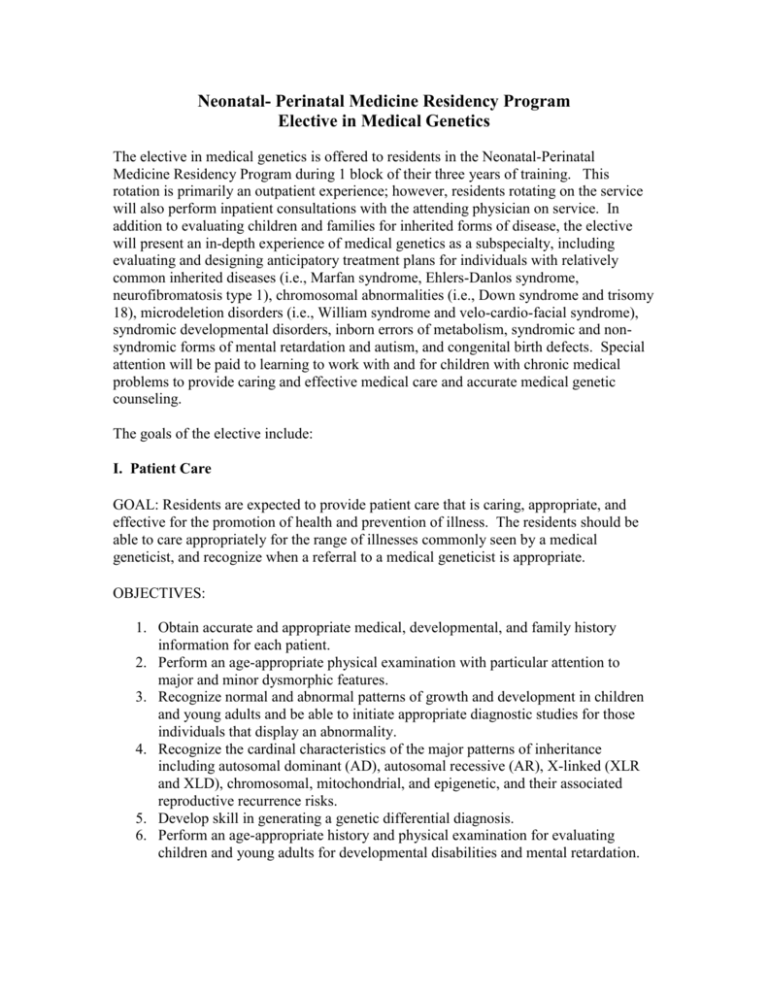
Neonatal- Perinatal Medicine Residency Program Elective in Medical Genetics The elective in medical genetics is offered to residents in the Neonatal-Perinatal Medicine Residency Program during 1 block of their three years of training. This rotation is primarily an outpatient experience; however, residents rotating on the service will also perform inpatient consultations with the attending physician on service. In addition to evaluating children and families for inherited forms of disease, the elective will present an in-depth experience of medical genetics as a subspecialty, including evaluating and designing anticipatory treatment plans for individuals with relatively common inherited diseases (i.e., Marfan syndrome, Ehlers-Danlos syndrome, neurofibromatosis type 1), chromosomal abnormalities (i.e., Down syndrome and trisomy 18), microdeletion disorders (i.e., William syndrome and velo-cardio-facial syndrome), syndromic developmental disorders, inborn errors of metabolism, syndromic and nonsyndromic forms of mental retardation and autism, and congenital birth defects. Special attention will be paid to learning to work with and for children with chronic medical problems to provide caring and effective medical care and accurate medical genetic counseling. The goals of the elective include: I. Patient Care GOAL: Residents are expected to provide patient care that is caring, appropriate, and effective for the promotion of health and prevention of illness. The residents should be able to care appropriately for the range of illnesses commonly seen by a medical geneticist, and recognize when a referral to a medical geneticist is appropriate. OBJECTIVES: 1. Obtain accurate and appropriate medical, developmental, and family history information for each patient. 2. Perform an age-appropriate physical examination with particular attention to major and minor dysmorphic features. 3. Recognize normal and abnormal patterns of growth and development in children and young adults and be able to initiate appropriate diagnostic studies for those individuals that display an abnormality. 4. Recognize the cardinal characteristics of the major patterns of inheritance including autosomal dominant (AD), autosomal recessive (AR), X-linked (XLR and XLD), chromosomal, mitochondrial, and epigenetic, and their associated reproductive recurrence risks. 5. Develop skill in generating a genetic differential diagnosis. 6. Perform an age-appropriate history and physical examination for evaluating children and young adults for developmental disabilities and mental retardation. 7. Recognize the diagnostic features of common genetic diseases including neurofibromatosis type 1 (NF1), Down syndrome, Marfan syndrome, and Turner syndrome. 8. Know the age-specific medical recommendations for common genetic diseases including neurofibromatosis type 1 (NF1), Down syndrome, Marfan syndrome, and Turner syndrome. 9. Recognize the characteristic signs and symptoms of common inborn errors of metabolism, and familiarize oneself with the baseline laboratory studies commonly used to evaluate children for these conditions. 10. Evaluate a child with an inborn error of metabolism who is receiving dietary therapy to assess the adequacy of the ongoing therapy, overall diet, and the patient’s growth and development. 11. Understand the indications for performing a chromosome analysis. Develop an appreciation for the indications for each of the different chromosome analyses (i.e., Giemsa-stained karyotype, fluorescent in situ hybridization (FISH) analyses, and chromosomal micro-array (CMA) studies). 12. Learn the essential elements of how to impart difficult news to patients and families and develop an appreciation for the challenges in providing nondirective counseling. II. Medical Knowledge GOAL: Residents should become knowledgeable about common inherited conditions, their evaluation and treatment in children and adolescents. Residents should consistently demonstrate proficiency in obtaining information through reading the reference literature, performing evidence-based reviews, clinical discussion, and weekly didactic discussions with the Genetics faculty members. They should apply an open-minded, analytical approach to acquiring new knowledge, using faculty experience whenever needed. OBJECTIVES: 1. Understand the basic principals of medical molecular genetics including patterns of inheritance, the stages and results of mitosis and meiosis, genetic recombination and linkage, and the molecular basis for human embryonic development. 2. Learn the cardinal features of the major patterns of inheritance including autosomal dominant (AD), autosomal recessive (AR), X-linked (XLR and XLD), chromosomal, mitochondrial, and epigenetic, and their associated reproductive recurrence risks. 3. Develop skills in performing a physical exam to recognize minor and major dysmorphic features and appreciate normal physical variability. 4. Learn about the available clinical cognitive measures and diagnostic studies for evaluating, diagnosing, and treating children and adults for developmental disabilities and mental retardation. 5. Learn the diagnostic features of common genetic diseases including neurofibromatosis type 1 (NF1), Down syndrome, Marfan syndrome, and Turner syndrome. Learn the age-specific medical recommendations for these conditions. 6. Learn and understand the indications for performing a chromosome analysis. Develop an appreciation for the indications for each of the different chromosome analyses (i.e., Giemsa-stained karyotype, fluorescent in situ hybridization studies, micro-array studies).Learn the indications and contraindications for DNA diagnostic studies, and learn how to interpret the results of these studies. 7. Develop a working understanding on how to effectively use available genetic databases (i.e., GeneTests and OMIM). 8. Learn the essential elements of how to impart difficult news to patients and families and develop an appreciation for the challenges in providing nondirective counseling. 9. Develop sensitivity to and understanding of cultural issues as they play a role in providing medical care. III. Practice Based Learning and Improvement: GOAL: Residents are expected to investigate and evaluate patient care practices and to appraise and assimilate clinical information to make appropriate patient management decisions. They should learn to improve their care of any given condition as they learn more about the condition they are treating during the course of the rotation and afterward. OBJECTIVES: 1. Consistently review the medical genetics literature using published and electronic (i.e., web-based) resources. 2. Consistently evaluate individual performance, identify gaps in knowledge, and target learning to fill these gaps. 3. Consistently demonstrate learning from error. 4. Work well with other learners to enhance common knowledge. 5. Provide, request, and constructively accept feedback about performance. IV. Interpersonal and Communication Skills GOALS: Residents are expected to consistently demonstrate interpersonal and communication skills that result in effective information exchange and collaboration with colleagues, patients, and their family. They must be able to approach the patient and families in a patient-centered manner. OBJECTIVES: 1. Create and sustain a therapeutic and ethically sound relationship with medical genetic patients and their families. 2. Demonstrate empathy and understanding for patient and family concerns. 3. Use effective listening skills (nonverbal, explanatory, and questioning) to elicit and provide information during the diagnostic interviews and counseling sessions. 4. Understand and explain issues of patient confidentiality, disclosure, and consent. 5. Use consultants appropriately and communicate effectively with them in a timely fashion. 6. Provide follow up to patients about diagnostic studies. 7. Maintain accurate and timely medical records. V. Professionalism GOALS: Residents are expected to understand and demonstrate a commitment to carrying out professional responsibilities, adherence to ethical principles, and sensitivity to a diverse patient population. OBJECTIVES: 1. 2. 3. 4. 5. 6. 7. 8. Consistently act in the best interest of the patient and family. Consistently demonstrate a caring and respectful demeanor when interacting with patients and families. Maintain patient/family confidentiality. Demonstrate prudence in the use of expensive diagnostic tests and treatments. Be sensitive to the child’s and family’s impression of the child’s condition. Be sensitive to the different expectations of patients and families based on ethnic, religious and cultural diversity. Respect the integrity of the child and family and their relative roles in decision making. Demonstrate respect for patient modesty. VI. Systems Based Practice GOALS: Residents are expected to practice quality health care that is cost-effective and to advocate for patients within the health care system by helping them successfully navigate through it for the best outcomes possible. They should be able to work effectively in the medical genetics multi-disciplinary team of providers to aid in the best outcomes possible. OBJECTIVES: 1. 2. Consistently advocate for patients and families and help them navigate the healthcare system by assisting them in making appointments, scheduling studies in a timely manner, and calling other providers to communicate essential information in a timely manner. Appropriately refer and follow up patients as necessary. 3. 4. Demonstrate appropriate communication and collaboration with the entire team needed for adequate treatment of seriously ill patients including subspecialty consultants, genetic counselors, dieticians, nurses, teachers, and social workers. Shows understanding and sensitivity about the complex environment in which medical genetics patients live, including their family, personal relationships, school, and financial needs. Medical Genetic Resources Reference Texts Thompson & Thompson: Genetics in Medicine, Nussbaum RL, McInnes RR, and Willard HF, editors; 6th edition, W. B. Saunders, Philadelphia, PA, 2004. Emery and Rimoin’s Principles and Practice of Medical Genetics: Rimoin DL, Connor JM, Pyeritz RE, and Korf BR, editors; 5th edition, Chruchill Livingstone Elsevier, Philadelphia, PA, 2007. The Metabolic & Molecular Basis of Inherited Disease: Scriver CR, Beaudet AL, Sly WS, and Valle D, editors; 8th edition, McGraw-Hill, New York, NY, 2005. Inborn Errors of Development: The Molecular Basis of Clinical Disorders and Morphogenesis: Epstein CJ, Erickson RP, and Wynshaw-Boris A, editors; 2nd edition, Oxford University Press, New York, NY, 2008. Syndromes of the Head and Neck: Gorlin RJ, Cohen MM Jr, and Hennekam RCM, editors; 5th edition, Oxford University Press, New York, NY, 2005. A Clinical Guide to Inherited Metabolic Disease: Clarke JTR; 3rd edition, Cambridge University Press, Cambridge, UK, 2006. Online References Online Mendelian Inheritance in Man: http://www3.ncbi.nlm.nih.gov/Omim/ GeneTests: http://www.genetests.org/ GeneLetter: http://geneletter.com/index Genetic Alliance: http://www.geneticalliance.org American College of Medical Genetics: http://www.acmg.net/
